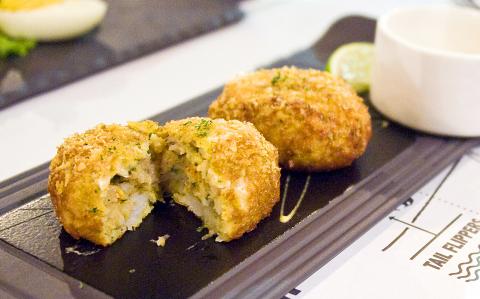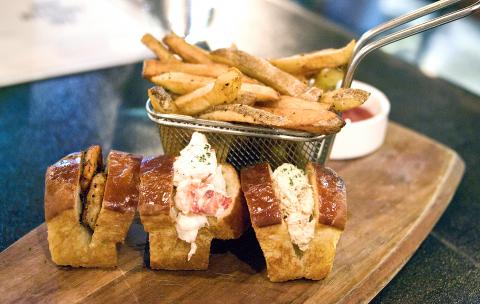From time to time, I still think of that amazing lobster roll I had at Ed’s Lobster Bar by the New York City waterfront on my last visit.
So I was pleasantly surprised when I passed by the Lobster Bar in Taipei. However, the restaurant’s higher-end, atmospheric interior, had always deterred me from just popping in for a quick seafood fix.
Eventually, I brought a date. But as soon as we sat down it became apparent that, due to portions and pricing, we should have brought a group so that we could sample the restaurant’s intriguing and diverse menu, which includes far more than its namesake suggests. For example, we didn’t order the seafood paella because there was a minimum order of two portions (NT$420 per portion), and who wants to fill up on rice when there’s lobster?

Photo: Han Cheung, Taipei Times
Also, visit early if you want to try the surf and turf burger (NT$680), featuring prime shoulder meat, foie gras and lobster. Alas, they only make 10 of these per day.
For appetizers, we ordered the deviled eggs (NT$280) and the crab cakes (NT$380 for two). The crab cakes were excellent, as each bite contained copious amounts of juicy crab meat with little filler. The abundance of meat, though, caused the bottom of the crab cake to become slightly soggy — but I’m not complaining. They were flavorful yet not greasy, and I didn’t need the lemon or tartar sauce that it was served with.
The deviled eggs were tart and rich, with faint sweet bacon highlights from the slivers on top. This appetizer would be better shared in a group, as with four eggs per order, the savoriness became overwhelming after the first two halves.

Photo: Han Cheung, Taipei Times
Since we had been talking about sandwiches, the mini rolls (NT$380 for three) were an obvious choice. The bite-sized rolls form all three of the restaurant’s signature seafood: lobster, crab and shrimp. This is where this restaurant really shines.
The generously-portioned lobster salad with a slight dollop of mayo was served in a soft roll and was a harmonious match that melted in my mouth. The crab roll was also in salad form, but with less mayo and not as sweet. The crab didn’t come in chunks like the lobster, constituting a finer texture. With this sandwich, the bread had a firmer texture, making an enjoyable contrast from the previous roll.
The shrimp roll was saltier, which balanced out the other two rolls. This one was my least favorite, as the shrimp was grilled and a bit chewy.
Since we were at a lobster restaurant, we splurged and ordered another entree. This was a mistake. Although filled with the sweet crustacean, the lobster ravioli (NT$620) in lobster sauce somehow felt more like a Chinese wonton than its Italian counterpart. The pasta was unevenly cooked — too firm in some places, overly soft in others and it fell apart quite easily.
The lobster sauce had appealing nutty overtones, but erred on the salty side and, like the noodles, carried more of an Asian than Italian consistency. Abundant garlic slices provided a kick, but as a whole it overpowered the main ingredient.
Later, I surfed the Internet to see what others were saying about Lobster Bar and the anecdotal consensus is that the uni pasta (NT$520) or duck truffle risotto (NT$480) would be a better entree choice despite their lack of, ah, lobster.
Although we didn’t try any alcohol, the menu has a small selection of beers, including the green tea-infused Iki and Hitachino Nest. It also features standard classic cocktails, hot cocktails as well as originals such as Alice in Lobsterland (NT$400, mango puree, cream, eggnog, soda water).
When I left, I wish I had just stuck to what I originally craved. Next time I come, I’m just going to sit by the bar and order a full-sized lobster roll with a beer.

Oct. 27 to Nov. 2 Over a breakfast of soymilk and fried dough costing less than NT$400, seven officials and engineers agreed on a NT$400 million plan — unaware that it would mark the beginning of Taiwan’s semiconductor empire. It was a cold February morning in 1974. Gathered at the unassuming shop were Economics minister Sun Yun-hsuan (孫運璿), director-general of Transportation and Communications Kao Yu-shu (高玉樹), Industrial Technology Research Institute (ITRI) president Wang Chao-chen (王兆振), Telecommunications Laboratories director Kang Pao-huang (康寶煌), Executive Yuan secretary-general Fei Hua (費驊), director-general of Telecommunications Fang Hsien-chi (方賢齊) and Radio Corporation of America (RCA) Laboratories director Pan
The consensus on the Chinese Nationalist Party (KMT) chair race is that Cheng Li-wun (鄭麗文) ran a populist, ideological back-to-basics campaign and soundly defeated former Taipei mayor Hau Lung-bin (郝龍斌), the candidate backed by the big institutional players. Cheng tapped into a wave of popular enthusiasm within the KMT, while the institutional players’ get-out-the-vote abilities fell flat, suggesting their power has weakened significantly. Yet, a closer look at the race paints a more complicated picture, raising questions about some analysts’ conclusions, including my own. TURNOUT Here is a surprising statistic: Turnout was 130,678, or 39.46 percent of the 331,145 eligible party

President William Lai (賴清德) has championed Taiwan as an “AI Island” — an artificial intelligence (AI) hub powering the global tech economy. But without major shifts in talent, funding and strategic direction, this vision risks becoming a static fortress: indispensable, yet immobile and vulnerable. It’s time to reframe Taiwan’s ambition. Time to move from a resource-rich AI island to an AI Armada. Why change metaphors? Because choosing the right metaphor shapes both understanding and strategy. The “AI Island” frames our national ambition as a static fortress that, while valuable, is still vulnerable and reactive. Shifting our metaphor to an “AI Armada”

The classic warmth of a good old-fashioned izakaya beckons you in, all cozy nooks and dark wood finishes, as tables order a third round and waiters sling tapas-sized bites and assorted — sometimes unidentifiable — skewered meats. But there’s a romantic hush about this Ximending (西門町) hotspot, with cocktails savored, plating elegant and never rushed and daters and diners lit by candlelight and chandelier. Each chair is mismatched and the assorted tables appear to be the fanciest picks from a nearby flea market. A naked sewing mannequin stands in a dimly lit corner, adorned with antique mirrors and draped foliage